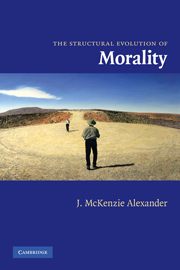5 - Fairness
Published online by Cambridge University Press: 27 August 2009
Summary
How do we understand justice? Thrasymachus argued in the Republic that it was merely the interest of the stronger party, whereas Glaucon argued that justice derived from mutually beneficial mutual agreement. These two answers barely touch the question, of course, for the answer depends greatly upon what sense of “justice” we speak of, among many other things. Of the two main types of justice – distributive and corrective – in this chapter I concentrate on the former, in a very general sense. The discussion will turn to issues of corrective justice in the following chapter, again understood in a very broad sense. In both chapters, I argue that justice emerges out of the self-interested actions of rational agents as a mutual agreement of a very special kind.
The common element to both, a mutual agreement of a special kind, suggests that justice arises as an outcome of a process of rational deliberation, in which several parties meet to negotiate a settlement. Negotiating a settlement is a complex process, with many strategic considerations having to be made by each party. Such considerations include whether one should state up-front everything one wants at the beginning of negotiations or hold off from stating these wants until later. The best course of action for each person would seem to depend upon what everyone else does.
- Type
- Chapter
- Information
- The Structural Evolution of Morality , pp. 148 - 198Publisher: Cambridge University PressPrint publication year: 2007

